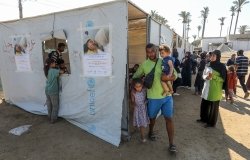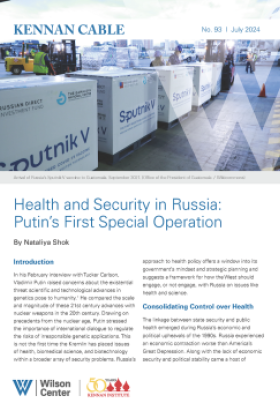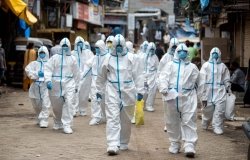Environmental Film Festival Screening: The Blood of Yingzhou District
For the eighth year in a row, the China Environment Forum hosts a screening of a film in the Environmental Film Festival in the Nation's Capital. This year's film—The Blood of Yingzhou District—won best documentary short subject at the 2007 Academy Awards® for its portrayal of HIV/AIDS orphans in China.
Overview
For the eighth year in a row, the China Environment Forum hosted a screening of a film in the Environmental Film Festival in the Nation's Capital. This year's film—The Blood of Yingzhou District—won best documentary short subject at the 2007 Academy Awards® for its portrayal of HIV/AIDS orphans in China. The documentary was filmed as part of the China AIDS Media Project (CAMP), which film director Ruby Yang and producer Thomas Lennon established in 2003 to help dissemination AIDS information in China.
The film relates the sobering story of what happens when traditional Chinese obligations to family and village collide with the terror of AIDS. The central figure is Gao Jun, a young village boy from Anhui Province, who lost both parents to the disease and is himself infected. Little is known about him, even his age, and he does not speak a word until near the end of the film. Gao Jun reveals a ferocious resolve to live, even as his extended family and foster parents debate whether or not to keep him.
Scope of the HIV/AIDS Problem in China
After the film, Gretchen Bachman (senior technical officer for orphans and vulnerable children programs at Family Health International) and Jennifer L. Turner (China Environment Forum) gave short talks and fielded questions from the audience.
There are an estimated 650,000 cases of AIDS in China. The film focused on one unique aspect of the spread of the disease in China; namely, rural farmers (mainly in Henan, Hubei, and Anhui provinces) who became infected from unhygienic blood-selling businesses. In the late 1980s, such businesses traveled to rural areas giving many poor farmers 50 Yuan and some food in exchange for extracting platelets. Blood from multiple donors would be removed, mixed with the blood of other donors, and then pumped back into their bodies after the platelets had been removed. This enabled the farmers to give blood again more quickly. Thus whole villages became infected very rapidly and many children were orphaned or infected.
Treating the Children
As is the case with all epidemics, marginalized groups, such as children, are most at risk. In a country rated 187 out of 191 for accessibility of health care, diseases like AIDS are further impoverishing the poor, and the support infrastructure for orphaned children is weak. The film followed the challenges faced by children of three families in which both parents died of HIV/AIDS infections, highlighting some efforts by international organizations, such as the Clinton Foundation and domestic and nonprofit charity groups, that are beginning to create services for such abandoned children in China.
Gretchen Bachman highlighted three main constraints to treating children for AIDS in poor rural communities in China, like those depicted in the film: (1) infected women do not seek prenatal care for preventative treatment for the child; (2) the equipment to test children under 18 months old is too expensive, thus children are diagnosed late; and (3) there is little support for families that agree to foster AIDS orphans, whether they are infected or not.
The SARS and Avian Flu outbreaks in China over the past few years underscored the potential threat epidemics pose to the economy and social stability. Thus, the Chinese central government has been prioritizing healthcare reforms and disease control, as well as more openly discussing and dealing with HIV/AIDS.
Currently, free HIV/AIDS care is offered to all infected adults, however Chinese children often lack access to appropriate types of AIDS medication. For example, in the film, Gao Jun's foster mother complains to a doctor that the adult pills she cut up gave him stomachaches. He and other children would benefit from having syrups and more child-friendly types of medications.
The Future
The AIDS problem in China is likely to grow over the next 10 years, with intravenous drug use on the rise and large migrant populations providing a mobile vector for the disease. Part of the difficulty in stemming the infection rate is the lack of local government capacity and willingness to deal with the AIDS issue. Jennifer Turner explained that the decentralization of the Chinese government, which brought such economic success to the country, also makes it difficult for the central government to control the local governments. In addition, there is tension within the government about providing free services to at-risk populations whose actions are illegal, such sex workers and drug users. The true rate of infection in China is difficult to assess, for local governments often under-report AIDS cases for fear of losing investment, and many infected Chinese individuals refuse to report or seek treatment for AIDS for fear of discrimination.
Drafted by Linden Ellis.
Speakers
Hosted By

China Environment Forum
Since 1997, the China Environment Forum's mission has been to forge US-China cooperation on energy, environment, and sustainable development challenges. We play a unique nonpartisan role in creating multi-stakeholder dialogues around these issues. Read more

Environmental Change and Security Program
The Environmental Change and Security Program (ECSP) explores the connections between environmental change, health, and population dynamics and their links to conflict, human insecurity, and foreign policy. Read more

Maternal Health Initiative
The Wilson Center’s Maternal Health Initiative (MHI) is dedicated to improving the lives of women, adolescents, and children around the world. MHI convenes experts from around the world to discuss solutions to end preventable maternal and newborn deaths and to navigate gender-based global health issues and their links to foreign policy. MHI explores a wide range of policy-related topics, including gender equity, global health, health care workforce and systems, caregiving, gender-based violence, workforce participation, girls’ education, and sexual and reproductive health and rights. MHI is globally focused with additional attention to women and girls living in humanitarian settings. Read more
Thank you for your interest in this event. Please send any feedback or questions to our Events staff.










